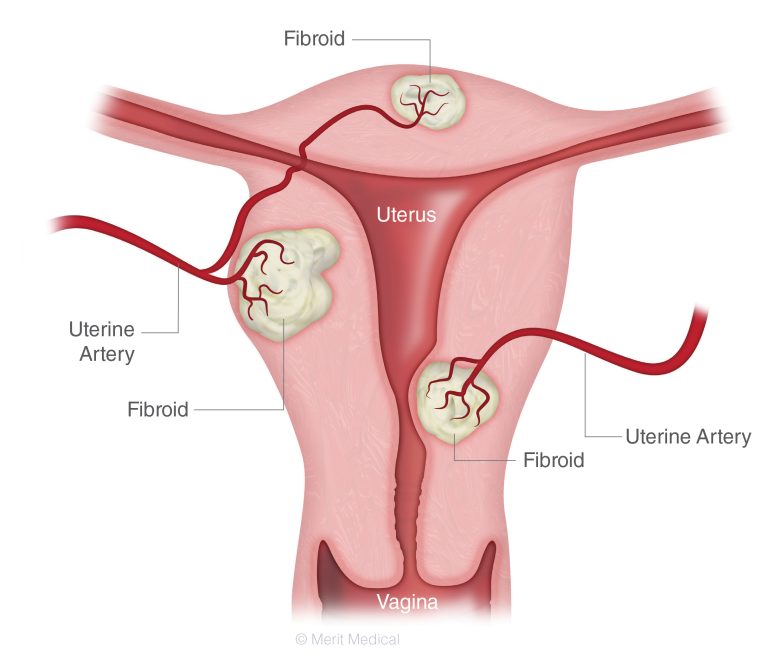A fibroid is a non-cancerous (benign) growth of the womb (uterus). They are also called uterine myomas, fibromyomas or leiomyomas. Their size can vary. Some are the same size as a pea and some can be as big as a melon.
Fibroids are common and usually cause no symptoms. However, they can sometimes cause heavy periods, tummy (abdominal) swelling and urinary problems.
Signs and symptoms
- Changes in menstruation
- Longer, more frequent, or heavy menstrual periods
- Menstrual pain (cramps)
- Vaginal bleeding at times other than menstruation
- Anemia (from blood loss)
- Pain
- In the abdomen or lower back (often dull, heavy and aching, but may be sharp)
- Pressure
- Difficulty urinating or frequent urination
- Constipation, rectal pain, or difficult bowel movements
- Abdominal cramps
- Enlarged uterus and abdomen
- Miscarriages
- Infertility
Fibroids also may cause no symptoms at all. Fibroids may be found during a routine pelvic exam or during tests for other problems.
When to see a doctor?
See your doctor if you have:
- Pelvic pain that doesn't go away
- Overly heavy, prolonged or painful periods
- Spotting or bleeding between periods
- Difficulty emptying your bladder
- Unexplained low red blood cell count (anemia)
Seek prompt medical care if you have severe vaginal bleeding or sharp pelvic pain that comes on suddenly.
رحم میں فائبرائڈز
یہ ایک رحم (بچہ دانی) کی گلٹی ہے جو کینسر نہیں ہے ۔ انہیں مایوما ، فائبرومایوما یا لیومایوما بھی کہا جاتا ہے۔ ان کا سائز مختلف ہو سکتا ہے۔ کچھ ایک مٹر کے دانے کے برابر ہوتے ہیں اور کچھ خربوزے کی طرح بڑے ہو سکتے ہیں۔ فائبرائڈز عام ہیں اور عام طور پر کوئی علامات پیدا نہیں کرتے ہیں۔ تاہم ، وہ بعض اوقات بھاری ماہواری ، پیٹ میں سوزش اور پیشاب کے مسائل پیدا کرسکتے ہیں۔
علامات
ماہواری میں تبدیلیاں
- طویل ، زیادہ بار ، یا بھاری ماہواری
- حیض میں درد بڑھ جانا
-ماہواری کے علاوہ بھی خون آنا
-خون کی کمی
دباؤ
- پیشاب کرنے میں دشواری یا بار بار پیشاب آنا
-قبض ، پیٹھ میں درد
بڑا رحم یا پیٹ کا نچلا حصہ
بار بار حمل ضائع ہونا
حمل میں رکاوٹ
فائبرائڈز معمول کے چیک اپ کے دوران یا دیگر مسائل کے ٹیسٹ کے دوران بھی مل سکتے ہیں۔
ڈاکٹر سے کب رجوع کریں
اگر آپ کو درج ذیل علامات ہیں تو جلد از جلد اپنے ڈاکٹر سے ملیں:
پیٹ کا نچلے حصے میں درد
بہت زیادہ بھاری ، طویل یا تکلیف دہ ماہواری
ماہواری کے علاوہ داغ یا خون آنا
پیشاب کرنے میں مشکل
خون کی کمی
اگر آپ کو ماہواری میں بہت درد ہو یا زیادہ خون آئے تو فوری طور پر ڈاکٹر کو بتائیں
Doctors to consult (Gynecologist):
Dr Asma Sajid, Dr Fatima Akhtar Naseem, Dr Shumaila Raza
Note: Click the Doctor's name to make an appointment.
Reference:
https://www.acog.org/womens-health/faqs/uterine-fibroids
https://www.mayoclinic.org/diseases-conditions/uterine-fibroids/symptoms-causes/syc-20354288
https://patient.info/womens-health/periods-and-period-problems/fibroids

